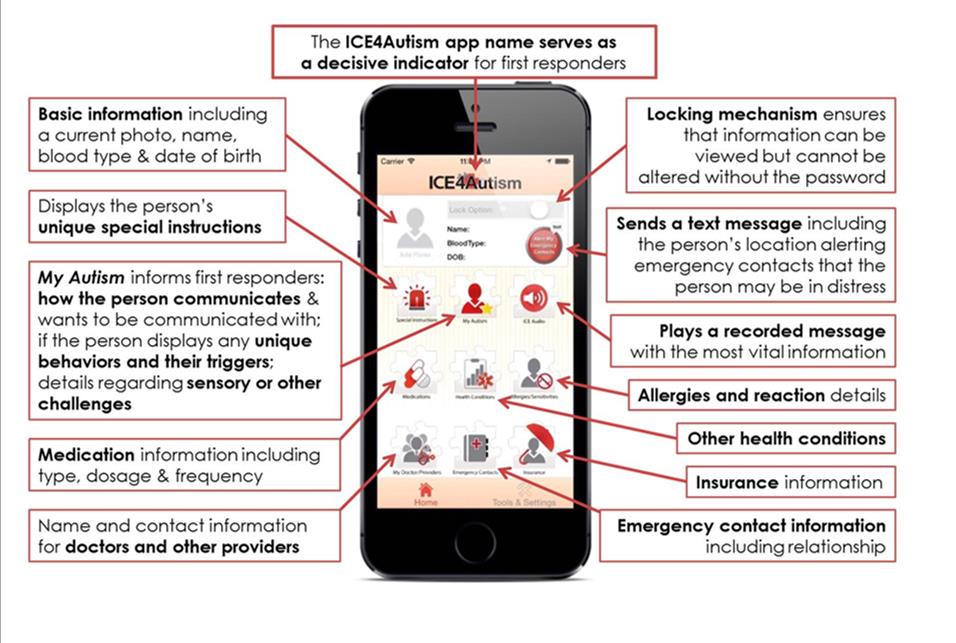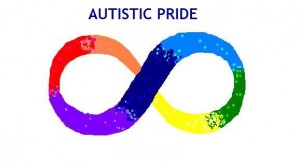
ICE4Autism Features
Emergency situations are challenging for everyone, but the the sensory, communication, social and behavioral challenges associate with autism spectrum disorder (ASD), can turn an emergency into a disaster for person with autism.
What is ICE4Autism?
ICE4Autism is the only ICE (in case of emergency) mobile app specially designed to meet the unique needs of individuals with ASDs. It stores vital information about an autistic person’s unique needs and sensitivities directly on their iPhone or iPad affording a practical and effective means of providing first responders with actionable information about themselves quickly and efficiently.
What is “autism-specific” about ICE4Autism?
ICE4Autism was developed in collaboration with people with autism for people with autism. It was designed based on the recognition that each person’s autism is as unique as the individual him/herself. The distinctive nature of autism means that even if first responders are aware that a person has autism, they do not have the specifics necessary to treat that particular individual properly.
First responders, ER doctors and nurses need to know what the particular person’s autism involves. Does s/he, for example, have communication differences, and if so, what are they? Does s/he have sensory issues? How does s/he react when overstimulated? And how can and should they respond effectively and appropriately?
ICE4Autism is person-centered and makes no assumptions or generalizations. Each self-explanatory widget stores and then displays only the information the person (or a loved one) enters about his/her individual needs.
Additional Special Features
The Alert my Emergency Contacts button sends a text message – including the user’s location pinned on Google maps — to pre-designated emergency contacts notifying them that the person may be in distress. In addition to its obvious usefulness in emergency situations, this feature can be used any time the user feels uneasy or in need of a bit of extra support.
The ICE Audio button plays the user’s own pre-recorded message including the most important information about his/her needs, sensitivities, behaviors and anything else s/he (or a loved one/caregiver) deems vital to their treatment. This special feature can be of particular value when the user is unable to communicate at all and/or when multi-tasking by first responders is critical to care.
Who should get ICE4Autism and Why?
Emergencies happen! They happen to everyone and they happen without warning! The good news is that it has never been easier to be prepared! Planning for the unexpected can be as simple as just a few clicks to download an ICE app and just a few minutes to enter your personal information.
EVERYONE should have an ICE app installed on their mobile devices – it’s just plain common sense! And if you or someone you love has autism, then ICE4Autism is the right ICE app for you. In addition to providing emergency contact, allergy, medications and other medical and insurance information, ICE4Autism can also provide first responders with specific details about how you want and need to be treated based on the personalized information about YOU entered in the app.
Kids, teens and adults with autism should have ICE4Autism on their devices because you simply never know when an emergency will strike. And, parents, siblings and caregivers are encouraged to install it on their devices, as well. Having ICE4Autism on your devices means that all the important – and often complicated and tough to explain “off the cuff” — details about the person’s unique needs are readily accessible whether s/he is out alone or with a loved one who can help.
Is the information entered into ICE4Autism secure?
The ICE4Autism mobile app stores all of the information entered directly on the user’s device. The special Lock Option password protects the information entered in the app ensuring that data can be viewed in the locked position, but it cannot be altered.
On which devices can ICE4Autism be installed and used?
The ICE4Autism mobile app is designed for both iPhone and iPad and can be installed on any iPhone 4, 5, 6 and 6Plus, iPad or iPod Touch. It requires iOS7.1 or later
Where to get ICE4Autism, how much (little) it costs and more info about it
ICE4Autism is available on the App Store (https://itunes.apple.com/app/ice4autism/id969601780?mt=8 or search: ICE4Autism) for a one-time fee of only $1.99 (on the US App Store) — or a similarly nominal fee on your country’s App Store — for the full-featured application. ICE4Autism has NO pop-up ads, NO in-app purchases and requires NO on-going subscription fees.
Learn more including detailed descriptions of each ICE4Autism feature, FAQs, a downloadable step-by-step user guide, a brief video and much more at www.ICE4Autism.com




